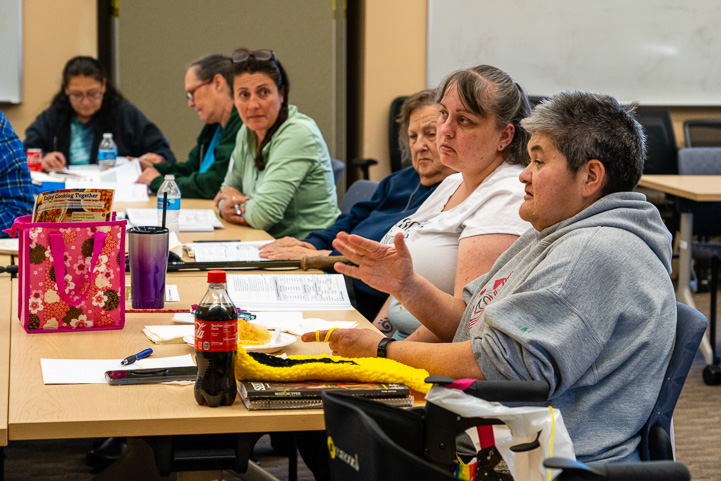Seed to Supper classes grow new gardeners

Veronica, right, shares about her gardening experience during a Seed to Supper class in Grand Ronde.
In a conference room in Grand Ronde, gardeners of varying experience levels are engaged in a lively discussion about composting. The conversation ranges from which items can be composted to what kinds of containers work best. Those with firsthand experience offer advice, while others take notes.
The discussion is part of a Seed to Supper class, a six-week course designed to provide people with the basic skills and knowledge necessary to grow their own healthy food and stretch their grocery budget. This course is offered by the Iskam MǝkʰMǝk-Haws pantry in Grand Ronde, and is one of several taking place within the Food Share’s network of community gardens and partner agencies this year after most classes were canceled in 2020 and 2021.
The courses are often taught by master gardeners and cover topics including soil preparation, nutrients, planting seeds and starts, maximizing yields, and more. Courses can be adapted to meet the cultural needs of gardeners at a specific location. At Grand Ronde, the course will include lessons on how to grow and use plants that are traditional tribal First Foods.
A recent Seed to Supper course at Edgewater Community Garden in West Salem was taught bilingually to include the many Spanish speakers at that garden. According to Millyellen, the garden coordinator at Edgewater, having a Spanish-fluent instructor significantly lowered barriers to learning for many who attended.
“Because of that personal contact, I feel like gardeners came back to ask him other questions and he was able to dive deeper into soil and what works best here,” Millyellen says.
For Veronica, a student at the course in Grand Ronde, learning how to plan a garden and maximize nutritional value and cost savings are key takeaways. She lives in a tribal housing complex and has limited patio gardening space, but she used her COVID-19 relief funds to purchase cedar planter boxes and organic soil.
Now, Veronica is growing onions and several varieties of potatoes, as well as passionflower for use in teas and jellies. Some tomatoes she planted a bit early were lost to frost, but she’ll replant starts and try again.
She took a Seed to Supper course in 2019, but figures there’s more to gain by taking the course again.
“The cost of produce is the main reason, but I’m just here to learn more about gardening,” Veronica says. “There’s always something you miss the first time around, so I’m just here to see if I can learn something new.”
We can’t thank you enough for your support of programs like Seed to Supper, which puts the power of gardening in neighbors’ hands.

